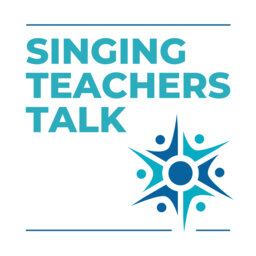Ep.172 Understanding Acoustic Registers with Ken Bozeman
Vocal pedagogy expert Ken Bozeman returns to the podcast, joining Alexa to explore laryngeal vs. acoustic registration, how vowel modification impacts vocal range, and the role of sensory feedback in refining vocal technique.
KEY TAKEAWAYS
- Laryngeal registration involves physical changes in the larynx and muscle use to shape vocal folds for different pitches. Acoustic registration focuses on the interaction between pitch, harmonics, and vowel resonance to produce different timbres. Understanding both helps singers and teachers refine vocal techniques.
- To understand vowel resonance and acoustic registration, try these exercises: modify vowel shapes to note resonance changes, whisper different vowels to explore natural resonances, sing with nasal consonants to feel nasal resonance, focus on harmonics and resonance shifts, and use vocal fry and whispers to identify resonances.
- To apply acoustic registration concepts, adjust vowel shapes for timbres like whoop (smooth), close (sizzly), and open (buzzier). Practise smooth transitions and use nasal consonants to explore resonances. Focus on sensory feedback, experiment with expression, and train your ear for harmonics. Record and analyse your singing for improvement.
- Ken recommends that singers and teachers focus on developing a strong understanding of acoustic principles and how they can be applied to improve vocal technique. He suggests using tools like the chiaroscuro whisper to explore and understand vocal resonances.
BEST MOMENTS
"Laryngeal registration deals with how the vocal folds are shaped for pitch, while acoustic registration is determined by the relationship between the pitch being sung and the potential harmonics of that pitch."
"In non-classical styles, the goal is to keep the entire range as speech-like as possible, which may involve compromises due to the different paint set of each pitch."
"Open timbre in acoustic terms is more oral. You feel it in the mouth."
"Attitude, is it an emotion or is it an attitude?”
EPISODE RESOURCES
Guest Website:
- http://www.kenbozeman.com/
- Get Ken’s book ‘Practical Vocal Acoustics’ here: https://rowman.com/ISBN/9781538174647/Practical-Vocal-Acoustics-Pedagogic-Applications-for-Teachers-and-Singers
- Get Ken’s book ‘Kinesthetic Voice Pedagogy 2’ here: https://www.voxped.com/KVP2.html
BAST Level 5 Singing Teacher Training Qualification
Relevant Links & Mentions:
- (Podcast) Singing Teachers Talk: Ep.146 How to Understand and Apply Vocal Acoustic Pedagogy with Ken Bozeman
- The work of Ingo Titze
- The work of Ian Howell
- (Podcast) Singing Teachers Talk: Ep.167 Understanding Nasality and Perception in the Singing Voice with Dr Nicholas Perna
- Wolfgang Saus: https://www.oberton.org/en/
- (Book) Voice is FREE After SOVT by Karin Titze Cox & Ingo Titze
- (Podcast) Singing Teachers Talk: Ep.170 Understanding the Science of SOVTs: In Conversation with Ingo Titze & Karin Titze Cox
- Approximate First Formant Locations from Ken Bozeman: http://www.kenbozeman.com/formant-location.php
- Kaya Herstad-Carney: kayamusic.com
- (Podcast) Singing Teachers Talk: Ep.103 How to ‘Measure’ a Singer with Kaya Herstad-Carney
- Voce Vista: https://www.vocevista.com/
- The work of Donald Miller
ABOUT THE GUEST
Kenneth Bozeman, BM, MM, is Professor Emeritus of Music, having taught at Lawrence University for 42 years. He holds degrees from Baylor University and the University of Arizona, and studied in Munich. He authored "Practical Vocal Acoustics" and "Kinesthetic Voice Pedagogy." Bozeman’s students have performed with major opera companies worldwide. He is a noted expert in vocal acoustics and continues to present at international conferences.
ABOUT THE PODCAST
BAST Training is here to help singers gain the knowledge, skills and understanding required to be a great singing teacher. We can help you whether you are getting started or just have some knowledge gaps to fill through our courses and educational events.
 Singing Teachers Talk
Singing Teachers Talk


